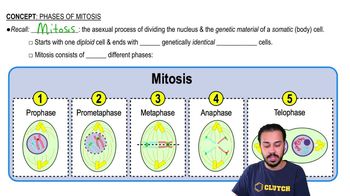Phases of Mitosis definitions Flashcards
 Back
BackPhases of Mitosis definitions
1/15
Terms in this set (15)
- MitosisA process of nuclear division in somatic cells resulting in two identical diploid cells.
- ProphaseThe first phase where chromatin condenses into chromosomes, nucleolus disappears, and mitotic spindle forms.
- PrometaphaseThe phase where the nuclear envelope breaks down and spindle fibers attach to kinetochores.
- MetaphaseThe phase where chromosomes align at the cell's equator, known as the metaphase plate.
- AnaphaseThe phase where sister chromatids are pulled apart to opposite poles of the cell.
- TelophaseThe final phase where chromosomes decondense, and nuclear envelopes reform around two nuclei.
- ChromatinThe material of which chromosomes are composed, consisting of protein, RNA, and DNA.
- ChromosomeA structure of nucleic acids and protein carrying genetic information in the form of genes.
- CentromereThe region of a chromosome where sister chromatids are joined and spindle fibers attach.
- CentrosomeAn organelle that serves as the main microtubule organizing center and forms the mitotic spindle.
- Mitotic SpindleA structure made of microtubules that segregates chromosomes during mitosis.
- KinetochoreA protein structure on chromatids where the spindle fibers attach during cell division.
- NucleolusA structure within the nucleus responsible for ribosome synthesis, disappears during prophase.
- Nuclear EnvelopeA double membrane that encloses the nucleus, breaks down in prometaphase and reforms in telophase.
- CytokinesisThe process following mitosis where the cytoplasm divides, forming two separate daughter cells.



